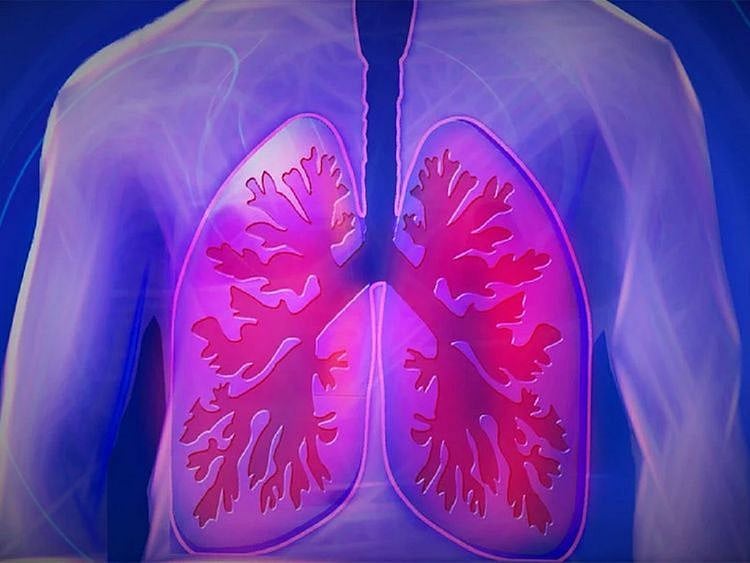UAE: National programme to detect lung cancer early, offer better survival rates
MoHAP workshop aids addition of lung cancer to National Cancer Early Detection Programme

Dubai: Patients with lung cancer stand to receive early treatment and better chances of survival with the UAE including the killer disease in its national programme for early detection.
The Ministry of Health and Prevention (MoHAP) has expanded the National Cancer Early Detection Programme to incorporate lung cancer to improve recovery rates and decrease mortality by ensuring early detection, a top official said on Thursday.
Dr Hussain Abdul Rahman Al Rand, assistant undersecretary for the Public Health Sector at MoHAP, said this during a scientific workshop targeting health workers in the public and private sectors in the UAE to improve their efficiency in detecting lung cancer.
Early detection
The National Cancer Early Detection Programme already includes breast, colon, and cervical cancers.
The workshop aimed to enhance the collaborative efforts of the private and public healthcare sectors in the early detection of cancer, emphasising the crucial role of regular screenings and vaccinations in disease prevention, MoHAP said.
Organised as part of the ministry’s strategy to include lung cancer within the National Cancer Early Detection Programme, this effort seeks to strengthen the UAE’s position as a leader in disease prevention and control globally, upholding the utmost healthcare standards, the ministry pointed out.
Cutting mortality
The ministry said the workshop is also part of a series of national health programmes and initiatives aimed at decreasing cancer-related mortality by 30 per cent by 2030 through prevention and early detection programmes.
Many cancer types are curable with early diagnosis and appropriate treatment.
Dr Al Rand stressed the need to stay abreast of global developments in cancer control by enhancing diagnosis, treatment, and prevention strategies based on the latest research findings and scientific studies in these domains.
He called for disseminating reliable and comprehensive information to individuals and healthcare professionals, adding that the workshop shed light on the latest scientific developments in cancer care, featuring insights from prestigious international and local experts.
Dr Al Rand reaffirmed that the Ministry plays a pivotal role in driving research and development related to cancer to the next level while delivering innovative scientific solutions to address current and future health challenges.
He also emphasised that the Ministry is committed to fostering robust partnerships with healthcare and community institutions to enhance public health and disease prevention measures.
10 million cancer-related deaths
Cancer is the second primary cause of death worldwide, with a toll of 10 million lives in 2021 alone, accounting for nearly one in six deaths globally.
Breast cancer tops the list of most prevalent cancers, followed by lung, colorectal, and prostate cancers.
Dr Nada Al Marzouqi, Director of the Public Health and Prevention Department and representatives of various health authorities and institutions across both sectors attended the workshop.
What is lung cancer?
• Lung cancer is a type of cancer that starts when abnormal cells grow in an uncontrolled way in the lungs. It is a serious health issue that can cause severe harm and death. • A leading cause of cancer-related deaths worldwide, lung cancer accounts for the highest mortality rates among both men and women, according to the World Health Organisation (WHO).
Causes
• Smoking tobacco (including cigarettes, cigars, and pipes) is the primary risk factor for lung cancer but it can also affect non-smokers.
• Other risk factors include exposure to secondhand smoke, occupational hazards (such as asbestos, radon and certain chemicals), air pollution, hereditary cancer syndromes, and previous chronic lung diseases.
Symptoms
• Symptoms of lung cancer include a cough that does not go away, chest pain and shortness of breath.
• Other symptoms include coughing up blood (haemoptysis), fatigue, weight loss with no known cause and lung infections that keep coming back.
Prevention
• Not smoking tobacco is the best way to prevent lung cancer.
• Other risk factors to avoid include secondhand smoke, air pollution and workplace hazards like chemicals and asbestos.
• Lung cancer is often diagnosed at advanced stages when treatment options are limited.
• Early treatment can prevent lung cancer from becoming worse and spreading to other parts of the body.
Sign up for the Daily Briefing
Get the latest news and updates straight to your inbox
Network Links
GN StoreDownload our app
© Al Nisr Publishing LLC 2026. All rights reserved.